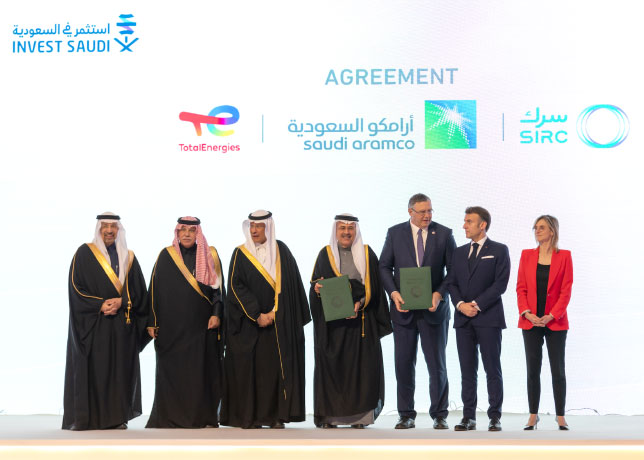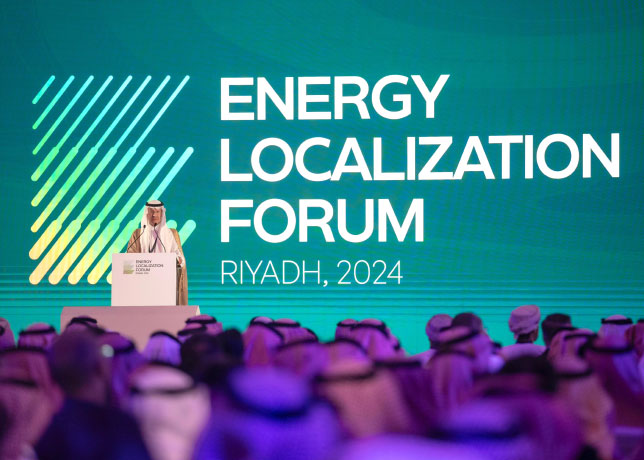
 Prince Abdulaziz at last year's Energy Localisation Forum
Prince Abdulaziz at last year's Energy Localisation Forum
Saudi Arabia's localisation initiatives, led by Aramco's iktva programme, are transforming the energy sector, driving economic growth, job creation, and innovation, while positioning the Kingdom as a global energy hub by 2030
In a rapidly changing global economy, localisation is no longer a mere strategic choice but an imperative.
For Saudi Arabia, the drive to localise is central to the transformation of its energy sector, aligning with the nation's broader ambitions to diversify its economy and achieve self-sufficiency.
Through initiatives like Aramco’s In-Kingdom Total Value Add (iktva) programme, the Kingdom is not only strengthening its energy sector but also laying the foundation for a more resilient, sustainable, and diversified economy.
Localisation efforts in energy are transforming the Kingdom into a global energy hub, creating jobs, stimulating investment, and empowering a new generation of homegrown talent.
A cornerstone of this transformation is the iktva programme, initiated by Saudi Aramco in 2015.
The programme is a key driver of the Kingdom's localisation strategy, designed to integrate local businesses into the energy sector's supply chain while reducing reliance on foreign imports.
Its success is exemplified by its vast scale, with thousands of local suppliers and manufacturers now playing a pivotal role in Aramco’s operations.
This initiative has been described as a "game changer" by Amin Nasser, Aramco’s President and CEO.
He said: "Through the outstanding commitment of our suppliers, we have created tens of thousands of quality job opportunities for the local workforce, and continue to contribute to the Kingdom’s long-term economic growth and diversification as we achieve our localisation objectives. We look forward to making further progress at the upcoming iktva Forum & Exhibition 2025."
Salem Al Huraish, Aramco Senior Vice-President of Procurement and Supply Chain Management, said: "The iktva programme has driven investors to localise a diversified range of offerings by establishing 186 new manufacturing facilities including more than 40 commodities manufactured for the 1st time in the Kingdom, such as specialty chemicals, Frac equipment, and many others."
Meanwhile, Forum, Nasir Al-Naimi, Aramco Upstream President reaffirmed the company's localisation efforts through the iktva programme.
He said: "Our localisation efforts started way back by developing our traders and local businesses. After that, we moved to developing service providers and manufacturers. Despite all of these achievements, we felt the need to take our efforts to the next level through a comprehensive program dedicated to localisation, which led to the inception of the iktva program in 2015."
IKTVA IS A FOREIGN INVESTMENT MAGNET
The iktva programme has encouraged significant investment in local industries, with Aramco’s procurement strategy leading to the establishment of 186 new manufacturing facilities.
These facilities span across a wide range of sectors, including the production of specialty chemicals, frac equipment, and other advanced materials that were previously not produced in the Kingdom.
The programme’s impact is far-reaching, creating a robust ecosystem that supports the energy sector while also enhancing the Kingdom’s industrial base.
With local suppliers now handling an increasingly large share of Aramco’s requirements, the iktva programme has redefined the landscape of Saudi Arabia’s energy sector, turning localisation into a source of competitive advantage.
However, localisation in the energy sector is not just about building capacity within companies. It’s about transforming entire industries and reshaping the workforce to meet the demands of a rapidly evolving market.
Aramco's approach to localisation goes beyond creating job opportunities; it includes investing in skill development and technology transfer.
By engaging with local educational institutions and offering training programmes, Aramco is equipping the Saudi workforce with the technical expertise required to thrive in a highly competitive energy market.
This focus on human capital development is a fundamental aspect of localisation, ensuring that Saudi citizens are not only employed but also empowered to become leaders in the energy sector.
The upcoming iktva Forum and Exhibition 2025, which will be held at the Dhahran Expo from January 13 to 16, further underscores the Kingdom’s commitment to localisation and its role as a global energy leader.
With over 100,000 attendees, 250 exhibitors, and more than 400 speakers, the event will serve as a platform to showcase cutting-edge innovations, explore new business opportunities, and deepen partnerships within the energy sector.
It will also highlight the achievements of the iktva programme, providing insights into how localisation is driving the Kingdom’s economic growth and diversification.
The forum's agenda promises to be a crucial step forward in Saudi Arabia's efforts to strengthen its energy sector and its place in the global energy market.
Localisation efforts extend beyond Aramco’s initiatives. The Energy Localisation Forum, a pivotal event organised by the Ministry of Energy in collaboration with key players such as Aramco, the Saudi Electricity Company (SEC), and SABIC, has catalysed numerous strategic agreements aimed at strengthening the Kingdom’s position as a global energy leader.
At the last forum, over 100 agreements were signed, with a total value of SAR104 billion, underlining the critical role of localisation in the growth of the energy sector.
These agreements span various areas, from oil and gas to renewable energy, hydrogen, and carbon management, and highlight the Kingdom's ambition to localise its energy supply chain further.
The overarching goal is to achieve a 75 per cent localisation rate in the energy sector by 2030, a target that reflects the Kingdom’s commitment to economic self-reliance and sustainability.
The localisation efforts in Saudi Arabia’s energy sector are not just a matter of economic necessity; they are part of a broader vision to position the Kingdom as a global energy hub.
The energy sector, which currently represents around 40 per cent of the Kingdom's GDP, is poised to become an even greater driver of national economic growth, with localisation playing a pivotal role in this transformation.
As Prince Abdulaziz bin Salman Al Saud, the Minister of Energy, has emphasised, localisation is not merely about reducing dependence on foreign suppliers; it is about creating a dynamic, competitive local industry capable of serving both domestic and international markets.
He said: "Energy is at the core of many other sectors, and our ambition is to transfer technology and products to Saudi Arabia, encompassing the entire supply chain. Therefore, we can see great opportunities to export world-class goods, services, and expertise to the world."
The Kingdom’s ambition to export world-class energy products, services, and expertise aligns with its broader Vision 2030 goals of diversifying the economy and fostering innovation across multiple sectors.
Localisation in the energy sector also has profound macroeconomic implications. By focusing on localising goods, services, and human capital, Saudi Arabia is strengthening its supply chain, which in turn boosts the national economy. Increased localisation means that more of the value created by the energy sector remains within the Kingdom, generating additional wealth and creating a cycle of reinvestment that benefits the entire economy.
As the Kingdom progresses towards its 2030 targets, the localisation of energy will not only improve energy security but also create high-value job opportunities in advanced industries, fostering innovation and entrepreneurship.
Moreover, localisation in energy presents numerous opportunities for international investors and companies looking to partner with Saudi Arabia.
The Kingdom’s efforts to attract global suppliers and establish strategic partnerships within the energy sector open up vast potential for collaboration.
These partnerships can drive innovation, bring new technologies to the Kingdom, and contribute to the development of a more sustainable and resilient energy supply chain.
For global companies, the localisation agenda presents a clear opportunity to participate in one of the world’s most dynamic energy markets while contributing to the Kingdom’s long-term economic growth.
CONCLUSION
Saudi Arabia’s localisation initiatives in the energy sector are transforming the Kingdom into a global energy powerhouse.
Through programmes like iktva and events like the Energy Localisation Forum, the Kingdom is fostering a sustainable, diversified economy that will not only serve its own needs but also contribute to global energy security and innovation.
By Abdulaziz Khattak


















































































